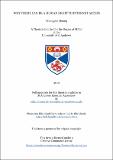Files in this item
Why there can be a human right to internet access
Item metadata
| dc.contributor.advisor | Cruft, Rowan | |
| dc.contributor.author | Huang, Zhengyue | |
| dc.coverage.spatial | ii, 112 p. | en_US |
| dc.date.accessioned | 2019-06-03T15:03:15Z | |
| dc.date.available | 2019-06-03T15:03:15Z | |
| dc.date.issued | 2019-06-24 | |
| dc.identifier.uri | https://hdl.handle.net/10023/17802 | |
| dc.description.abstract | In this dissertation, I argue that it is possible to claim a standalone natural human right to internet access. The central argument is in Chapter II. I start my argument by analysing the issue of trans-historical universality of human rights. Human rights are traditionally defined as rights possessed by all human beings in all places at all times. It is claimed that if a human right to X was not possible in the past due to X having been unavailable at that past time, then — on pain of contradicting the universality of human rights — there cannot be a human right to X now, and such human right claim is invalid. If the internet as a historically contingent invention was not available in the past, then there cannot be a human right to internet access. I refute this challenge in chapter II, particularly in section 2.1 and 2.3. On this basis, I develop a framework based on the concept ‘harm’ which I call Theory Alpha (in section 2.5). I argue that Theory Alpha, with its Human Rights Generation Conditionals, provides a philosophical ground to justify human rights such as a right to internet access in a naturalistic approach. Chapter III, by reflecting on the current world, provides some reasons why a human right to internet access is possible according to Theory Alpha. Chapter IV addresses potential objections and issues regarding my Theory Alpha. Particularly, section 4.2 deals with how Theory Alpha would solve the issue concerning universality of human rights. I provide a more detailed preview of the dissertation in section 1.3. I conclude that Theory Alpha provides satisfactory answers to some important questions about human rights and supports that there can be a human right to internet access. | en_US |
| dc.language.iso | en | en_US |
| dc.publisher | University of St Andrews | |
| dc.rights | Attribution-NonCommercial-ShareAlike 4.0 International | * |
| dc.rights.uri | http://creativecommons.org/licenses/by-nc-sa/4.0/ | * |
| dc.subject | Human rights | en_US |
| dc.subject | Internet access | en_US |
| dc.subject | Natural human rights | en_US |
| dc.subject | Universality | en_US |
| dc.subject.lcc | HM851.H8 | en |
| dc.subject.lcsh | Right to Internet access | en |
| dc.subject.lcsh | Human rights--Philosophy | en |
| dc.title | Why there can be a human right to internet access | en_US |
| dc.type | Thesis | en_US |
| dc.type.qualificationlevel | Masters | en_US |
| dc.type.qualificationname | MPhil Master of Philosophy | en_US |
| dc.publisher.institution | The University of St Andrews | en_US |
| dc.identifier.doi | https://doi.org/10.17630/10023-17802 |
The following licence files are associated with this item:
This item appears in the following Collection(s)
Except where otherwise noted within the work, this item's licence for re-use is described as Attribution-NonCommercial-ShareAlike 4.0 International
Items in the St Andrews Research Repository are protected by copyright, with all rights reserved, unless otherwise indicated.


